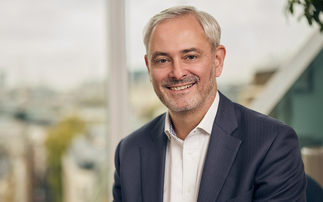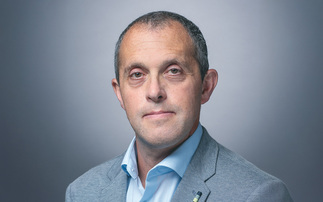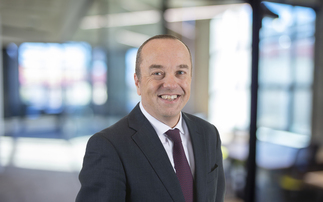Head of the Schroders multi-manager operation Andrew Yeadon is confident the team has the skills and experience necessary to outperform in the UK market
Schroders might be launching multi-manager offerings for the first time into the UK market but the wealth of experience gained from running similar products overseas means the team is confident of delivering strong returns.
The two new funds, which are jointly branded with the highly respected ratings agency Standard & Poor's, are being aimed at the investor who wants a professionally managed, diversified portfolio.
Andrew Yeadon, head of the Schroder multi-manager team, believes the widespread uncertainty in global markets makes it an ideal time for both the Schroder S&P Strategic Balanced Portfolio and the Schroder S&P High Alpha version to make their debuts.
Gaining access to the cream of today's fund management stars, he says, is a great way of tackling unpredictable global stock markets and avoiding the temptation to buy into fads that so often end in disaster.
"We recognise that no investment house can be the best in every class, so offering investors a package with the leader in each category is a very attractive proposition," he adds. "Most people accept that private investors often make mistakes, in part because they have less information and less time to study the market, making buying the right funds and avoiding fads very difficult. This is where a professionally managed and well diversified portfolio of funds can help."
And Yeadon, whose team manages more than $750m, is well placed to comment. A chartered financial analyst, he joined Schroders four years ago from UBS Brinson, where his roles included head of European equity strategy and portfolio construction.
Multi-manager may be just one way of accessing market exposure, he points out, but there are plenty of benefits in choosing this type of product over the more traditional types of funds.
Perhaps most important is the ability to tap into the experience of the specialist team at Schroders, as well as the detailed fund analysis provided by Standard & Poor's 55 specialist fund analysts.
"Multi-manager funds make a lot of sense, especially compared to the alternative, which for most people has traditionally meant collecting individual funds over the years and rarely looking at them. Investors that choose our multi-manager service can rely on us to maintain a portfolio of top-quality funds, which we will be monitoring on a daily basis."
So how will these two new portfolios be constructed? While they will share many fund holdings, they will differ in terms of asset allocation to meet varying investment objectives.
The Schroder S&P Strategic Balanced Portfolio will be the more conservatively managed fund with up to 85% invested in equities, up to 20% in bonds and approximately 10% in cash. Its aim will be to outperform the Lipper Balanced Managed sector average by 2% per year.
The Schroder S&P High Alpha Portfolio, on the other hand, will be more ambitious, with a target of outperforming the Lipper Active Managed sector by 3% per year. Between 70% and 100% of the fund will be invested in equities, with up to 15% available for bonds and cash. The team can also take advantage of the fund's Ucits III investment powers and invest up to 10% in alternative investments, such as hedge funds, private equity and property - an increasingly attractive proposition for anyone wanting true diversification.
As well as having a greater exposure to equities, funds in the active managed sector have also traditionally invested a greater portion overseas and Yeadon expects this to be reflected in the High Alpha portfolio. So which parts of the world are currently favoured?
"Well, at the headline asset allocation level, we prefer equities to bonds right now," notes Yeadon. "Within equities, we like Japan, the Far East and the emerging markets. We're pretty convinced things have changed in Japan after a long period in the doldrums. On the corporate level, we're seeing reasonable earnings growth and improving corporate governance, while the economy is much more vibrant than it was in the 1990s. Taking these factors together makes us feel Japan has potential to outperform."
The US market, however, is a different story. "We're not enthusiastic about the US," admits Yeadon. "It's purely on valuation terms. Relative to investment opportunities outside of the US, we don't think this is an area on which we should focus right now."
Yeadon is also a firm believer in focused portfolios with the aim for both products to hold between 12 and 15 funds. "One of the pitfalls is the mistake of over-diversifying portfolios," he explains. "We'll be backing our convictions and not carrying any baggage in the portfolio."
The aim will be to blend different funds and styles, with a particular emphasis on those expected to perform well at any given point in the investment cycle.
This is where the link-up with S&P plays a crucial role. In addition to weekly meetings, Standard & Poor's supplies Schroders with a range of exclusive services, such as a shortlist of some 200 leading funds globally.
This list is reviewed and updated every month, explains Yeadon, which helps us to focus our research effort.
The first task is to analyse each fund's performance track record, where its historic return achievements are examined, along with the manager's ability to deliver on a consistent basis.
"We're looking for added value, a degree of consistency and to understand the manager's style," explains Yeadon.
Face-to-face interviews with managers come next, with the Schroders team carrying out around 200 meetings every year. While labour intensive, this is a critical part of the research process.
"We speak to managers to better understand a product's strengths and weaknesses, the key personnel and their overall investment process," explains Yeadon.
And that's not all. Questionnaires are routinely sent out to managers requesting detailed information, while the managers of funds being considered for inclusion are required to provide Schroders with security-level holdings data.
Holdings data is fed into the Portfolio Risk Investment Strategy Manager (Prism), a sophisticated proprietary system developed by Schroders that allows further detailed analysis to take place. Linked to a number of other databases, this intranet-based tool provides exhaustive information on all the important risk characteristics of the portfolio, such as its industry and country exposure, its style bias - such as growth, value, or size - its volatility and tracking error, explains Yeadon.
"It's a critically important system and tells us everything we could ever want to know about the characteristics of a fund," he says.
So which potential high-flying funds have so far been identified?
"Merrill Lynch UK Dynamic, run by Mark Lyttleton, is one of the funds in which we will be investing," Yeadon says. "The combination of a talented manager with access to the extensive resources of a large investment house suggest to us it could do well.
"Lyttleton has an impressive record of running high-performance UK equity mandates and has achieved these returns in a variety of market conditions. As the portfolio is unconstrained, he has the flexibility to deliver strong returns."
In fact, the past few years have provided testing times for many fund managers, Yeadon concedes. Lately, concerns over economic growth, high oil prices and rising interest rates have been taking their toll on market confidence.
"It's a time of uncertainty and, at the macro-level, the picture is cloudy," admits Yeadon. "In fact, it is easy to draw up a list of negatives but I expect them to eventually turn into positives. Peaking at $49 per barrel, the oil price has been unsustainably high and will come down at some point."
Another worry for some investors is the looming presidential election in the United States, Yeadon says. But whatever the result, he feels it will be quickly forgotten as the market moves on.
"All these concerns come at a time when many companies are in good shape with solid balance sheets," he notes. "We think following the dramatic turnaround last year, we are moving into a more normal environment."
However, against such a mixed backdrop, why has the decision been taken to enter the UK market, particularly bearing in mind there are already a number of established players?
"This is our first offering to the UK retail market as our multi-manager proposition has so far been directed to overseas clients. But the success we've achieved there has encouraged us to make this commitment," explains Yeadon.
"Our capability is innovative and different. We will be the only fund management house with direct access to S&P's 55 analysts, which is a tremendous source of added value in terms of identifying the best funds in the market."
Looking ahead, Yeadon remains confident the macroeconomic concerns will be relatively short lived. "I'm more of an optimist than a pessimist," he says.
"We think equity markets have a good chance of being higher next year than they are now so it's a good time to be investing in this kind of product."











